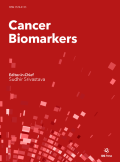Authors: Liu, Ru-Han | Ma, Teng-Fei | Yang, Qin | Xiao, Wen-Chang | Yin, Lu | Yin, Miao | Zhang, Jin-Song | Wang, Chi-Hua
Article Type:
Research Article
Abstract:
BACKGROUND: Prostate cancer (PCa) is one of the most common malignancies in men. PCa is difficult to detect in its early stages, and most patients are diagnosed in the middle to late stages. At present, drug therapy for advanced PCa is still insufficient. Some patients develop drug resistance in the later stage of therapy, which leads to tumor recurrence, metastasis and even treatment failure. Therefore, it is crucial to find new and effective drugs to treat prostate cancer. OBJECTIVE: The aim of this study was to investigate the anti-cancer effect of salidroside, an active ingredient in
…a traditional Chinese herbal medicine, on PCa. METHODS: Two human PCa cell lines, PC3 and DU145, were cultured and treated with salidroside. Cell viability and proliferation ability were analyzed through CCK-8 and colony assays, and cell migration ability was detected by Transwell and Scratch assays. RT-PCR and WB were used to detected the expression levels of moleculars related to cell proliferation, apoptosis, migration, and AKT signaling pathway. Forthmore, we performed rescue experiments with agonist to verify the affected signaling pathway. RESULTS: Salidroside inhibited the proliferation, colony formation, and migration of PCa cells. Meanwhile, apoptosis of PCa cells was enhanced. Moreover, salidroside inhibited PI3K/AKT pathway in PCa cells. The treatment of AKT agonist 740Y-P abrogated the inhibitory effect of salidroside on the PI3K/AKT signaling pathway. CONCLUSIONS: Our study demonstrated that in PCa cells, salidroside inhibites proliferation and migration and promots apoptosis via inhibiting PI3K/AKT pathway.
Show more
Keywords: Salidroside, prostate cancer, PC3, DU145, PI3K/AKT
DOI: 10.3233/CBM-220454
Citation: Cancer Biomarkers,
vol. 38, no. 3, pp. 321-332, 2023
Price: EUR 27.50





